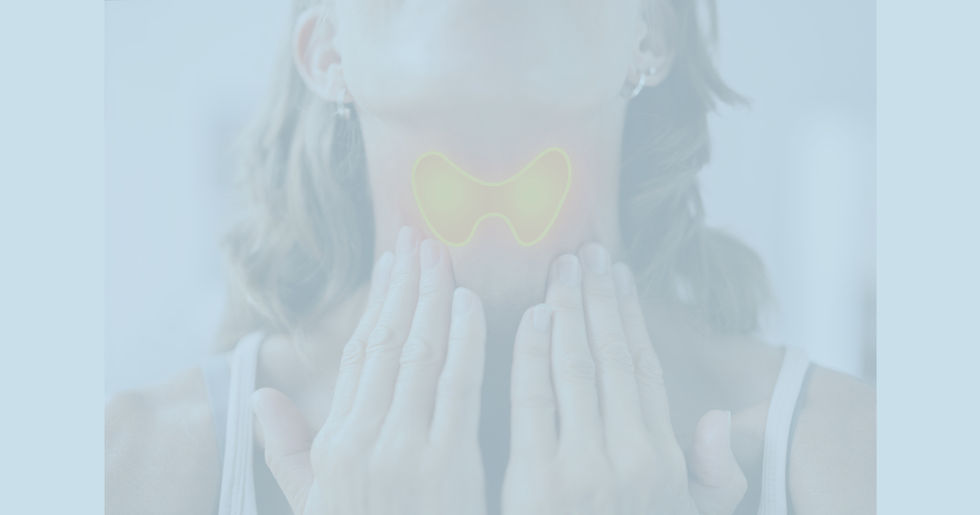Hashimoto’s Disease: A Clear Guide for Women Who Want Answers
- Dr. Jessica

- Nov 18, 2025
- 4 min read

Most women don’t realize how early thyroid issues begin.
The fatigue that doesn’t lift.
The cold that settles into your bones.
The fog that makes you second-guess your own memory.
The weight that won’t budge.
The mood shifts that feel like they came out of nowhere.
And then the lab report comes back.
“Normal.”
This is where so many women begin to lose trust in themselves. Not because their body is failing, but because they’re being told to ignore what it’s been whispering for years.
Hashimoto’s is one of the clearest examples of this gap. The space between what your body knows and what the system measures.
This article is you taking that trust back.
What Hashimoto’s Actually Is
Hashimoto’s is an autoimmune process.
Your immune system starts mistaking your thyroid for something dangerous.
Slowly, quietly, it creates inflammation.
Not enough to set off alarms at first.
Just enough to interrupt your energy, your warmth, your metabolism, your cycles.
You may hear different names: autoimmune thyroiditis, chronic lymphocytic thyroiditis, autoimmune thyroid disease. But the pattern is the same: a body trying to protect you in a way that ends up depleting you.
And it often starts long before TSH moves.
A Moment That Changed Everything
M.L. was 34.
On paper she was “fine.”
In her body she felt like she was fading.
Ten hours of sleep that did nothing.
A sweater in July.
A period that made no sense anymore.
She sat across from me and said, “I don’t recognize myself.”
When her antibodies came back sky-high, she didn’t look shocked. She looked relieved.
“Finally. Something that explains this.”
That’s the power of clarity.
Not fixing.
Just finally seeing what’s been true.
How Common Hashimoto’s Really Is
Far more common than most women realize.
Millions are walking around with symptoms long before doctors take a closer look.
Women are affected nearly ten times more than men.
And the most common ages? 30 to 55yrs - the exact years you’re expected to hold a household, a job, a relationship, a body, and a smile together.
You’re not an outlier.
Why It Happens
There isn’t one cause.
Hashimoto’s is what happens when several threads overlap:
Genetics.
Stress that never got a pause.
Low selenium, low vitamin D, low iron stores.
Gut imbalances that keep your immune system on edge.
Endocrine disruptors your body has been filtering for years.
None of these alone cause Hashimoto’s.
Together, they shift your immune system into a different rhythm.
And your thyroid feels it.
What’s Happening in the Thyroid Itself
Think of the thyroid as a small gland with a big job: energy, warmth, metabolism, menstrual rhythm, mood.
When immune cells drift into that tissue, inflammation begins. Slowly, the gland loses its ease. Over time, hormone output drops.
And here’s the part most women aren’t told:
Your symptoms will often show up before your bloodwork changes.
That’s not “in your head.”
That’s physiology.
How Hashimoto’s Feels in a Woman’s Life
It doesn’t happen in straight lines.
Some days you feel almost normal.
Some days everything is heavy.
Some days your heart races, then later everything slows down.
Cycles shift. Libido fades. Brain fog rolls in.
You may see:
Colder hands
Heavier or irregular periods
Fatigue that no amount of sleep fixes
Weight that won’t move
Dry skin, brittle hair
Anxiety or depression that comes out of nowhere
It’s not random.
It’s the thyroid trying to keep up.
KEY TAKEAWAY: If you have been struggling with miscarriages, you absolutely need to have your antibody tests run.
Anti-TPO antibodies
Anti-thyroglobulin antibodies
How We Actually Diagnose It
Not with one marker. Not with TSH alone.
A true thyroid assessment includes:
TSH
Free T4
Free T3
Anti-TPO antibodies
Anti-thyroglobulin antibodies
Sometimes ultrasound.
We’re not hunting for “normal.”
We’re looking for the deeper pattern, the one that explains why you don’t feel like yourself.
KEY TAKEAWAY: If you have been diagnosed with hypothyroidism, you absolutely need to have your antibody tests run.
Anti-TPO antibodies
Anti-thyroglobulin antibodies
What Helps You Feel Better
Hashimoto’s has no quick fix, but it also doesn’t require fear.
There are three places women feel the most shift:
Medication
Food and lifestyle
Targeted evidence based supplements
Selenium + myo-inositol
Vitamin D (if you’re deficient)
These aren’t magic bullets.
They’re small adjustments that move the system toward calm.
And then there’s the piece most women overlook:
Your thyroid is listening to your stress levels.
When the nervous system is tense, the thyroid slows.
When the body feels safe, hormones shift.
Sometimes the most potent medicine is permission to stop pushing through.
A Clear First Step
If your labs say normal but you know something’s off, start here:
TSH
Free T4
Free T3
TPO antibodies
Thyroglobulin antibodies
Ferritin
Vitamin D
Then ask the question most clinics skip:
“What story do these numbers tell when placed beside my symptoms?”
That’s the part I help women decode.
An Invitation To You
If you’re tired of feeling dismissed…
If you want someone who listens as closely to your symptoms as your labs…
If you want a clear path forward instead of another shrug…
I offer ten-minute calls to see if working together is a fit.
No pressure.
You don’t have to figure this out alone.
I’m here when you’re ready.


Comments